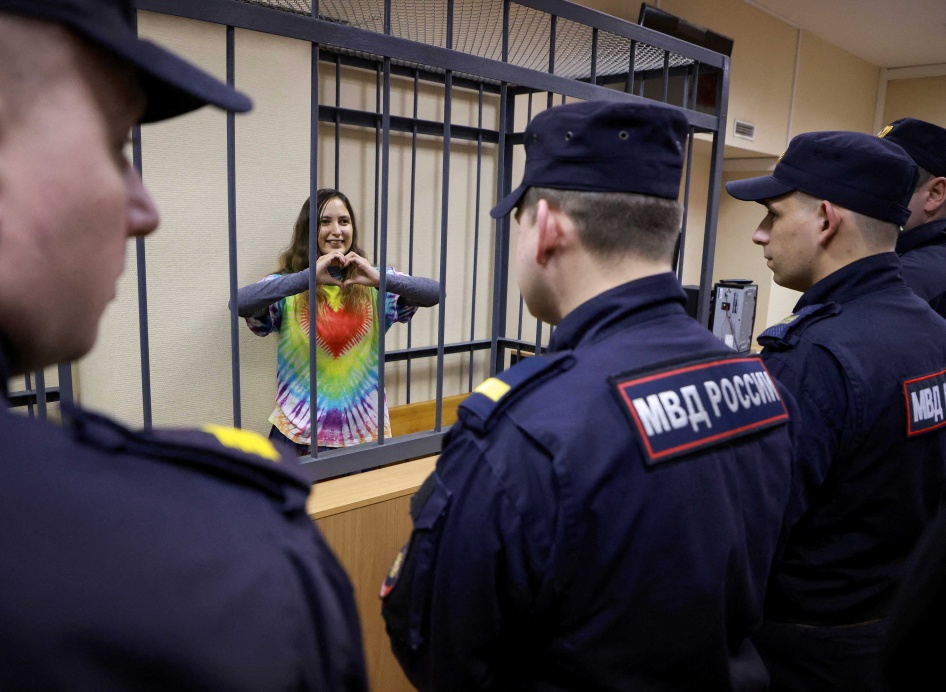(Berlin, January 11, 2024) – During the second year of its full-scale invasion of Ukraine, the Russian government increased war censorship, imprisonment of vocal critics, and the crushing of human rights activism, Human Rights Watch said today in its World Report 2024.
“As the Kremlin continues its war, it redoubled efforts to eradicate the mere possibility of public criticism of its foreign and domestic policies,” said Rachel Denber, deputy Europe and Central Asia director at Human Rights Watch. “At the same time, they are spewing homophobic and xenophobic tropes in an apparent attempt to distract public attention from the accumulating domestic social and economic challenges.”
In the 740-page World Report 2024, its 34th edition, Human Rights Watch reviews human rights practices in more than 100 countries. In her introductory essay, Executive Director Tirana Hassan says that 2023 was a consequential year not only for human rights suppression and wartime atrocities but also for selective government outrage and transactional diplomacy that carried profound costs for the rights of those not in on the deal. But she says there were also signs of hope, showing the possibility of a different path, and calls on governments to consistently uphold their human rights obligations.
Russian authorities continued to expand and harshen already extensive and repressive legislation. This includes laws on ‘foreign agents’ – now dubbed ‘foreign influence’ – “undesirables,” war censorship, and other measures to outlaw, silence, and imprison people who publicly oppose the Kremlin’s foreign or domestic policies. These especially target opposition leaders, activists, independent journalists, and human rights defenders.
Russian courts forcibly shut several prominent human rights groups upon request of the Justice Ministry, citing such formal pretexts as operating and attending events outside of Moscow, where they were registered, as well as noncompliance with “foreign agents” requirements. At least two people were detained and face imprisonment on “foreign agents”-related charges.
Some international organizations, including human rights groups, continue to be banned through the “undesirables” legislation. A law adopted in July widened the scope of banned foreign groups; it outlawed activities of any organization without registered offices in Russia. People in Russia who continue to engage with such groups risk prosecution and imprisonment.
After the International Criminal Court issued arrest warrants for President Vladimir Putin and children’s rights commissioner, Maria Lvova-Belova, for the forcible transfer of Ukrainian children from occupied areas of Ukraine and their unlawful deportation to Russia, authorities adopted a law criminalizing assistance to foreign and international bodies “to which Russia is not a party.”
They also intensified use of the charges of “discreditation” and disseminating “false information” about Russia’s armed forces to suppress anti-war speech and prosecute and imprison individuals for their lawful, peaceful expression. As of November 2023, at least 77 people were sentenced on “false information” and 52 on “discreditation” charges, according to the human rights group OVD-Info. Among them were prominent opposition figures and people with no background in activism. A law adopted in April lets authorities strip naturalized Russian nationals of their citizenship, even if this renders them stateless, and deport them for “discreditation” and “false information.”
Authorities increasingly prosecuted people on bogus treason, “confidential cooperation,” and espionage charges. According to the Russian human rights group First Department, authorities opened at least 21 criminal cases in 2023 against people who allegedly engaged in confidential cooperation with non-Russian nationals, under a law reminiscent of the Soviet-era ban on contacts with foreigners. According to media reports, in the first half of 2023, the Federal Security Service opened more treason cases than in all of 2022.
Russian authorities continued to subject imprisoned activists and members of persecuted religious minorities to repeated and prolonged placement in disciplinary cells, disregarding risks to those with health conditions.
They went to new lengths in abusing counter-extremism legislation to outlaw and persecute anti-war critics, opposition activists, and religious minorities. A number of opposition figures, Alexei Navalny’s former aides and supporters, as well as Navalny himself were sentenced to lengthy prison sentences on extremism charges. Members of the “Vesna” youth movement face extremism charges for peaceful anti-war activism. In November, the Supreme Court ruled to ban the “international LGBT movement” as an extremist organization following a lawsuit filed by the Justice Ministry, jeopardizing all forms of LGBT rights activism in the country.
Throughout 2023, Russian authorities intensified their crackdown LGBT people. They adopted a law targeting trans people that, among other things, prohibits transition-related health care and bars trans people from adopting or taking guardianship over children.
In Chechnya, Governor Ramzan Kadyrov’s administration continued to eviscerate all forms of dissent with impunity, targeting critics and retaliating against their family members, including by forcibly mobilizing men to fight in Ukraine.
Russian authorities also continued to tighten control over internet infrastructure, arbitrarily blocking websites without court orders, and expanding the list of state bodies tasked with doing so. Blocked content included independent media outlets, rights groups, thousands of websites criticizing Russia’s invasion of Ukraine, and content about LGBT people.
“The Kremlin’s battery of repressive measures apparently aims to leave a barren land where once there was a thriving civil society,” said Denber. “Concerned governments and international organizations should step up and fortify the resilience of Russia’s civil society.”









